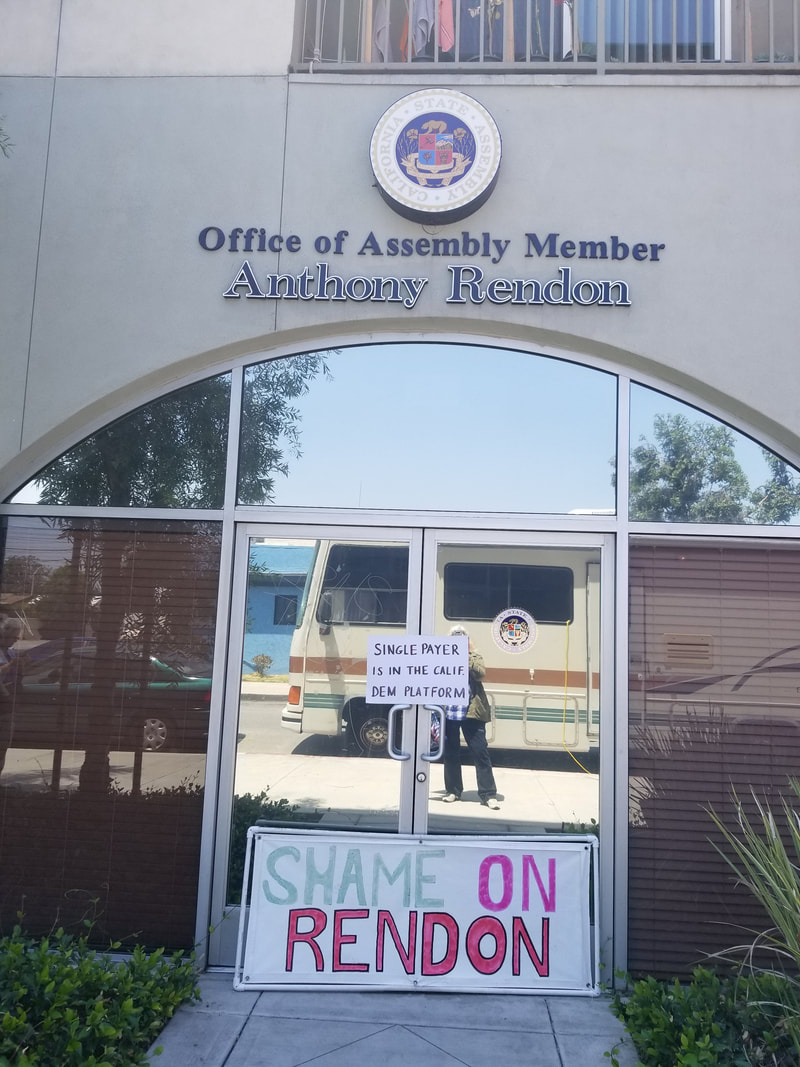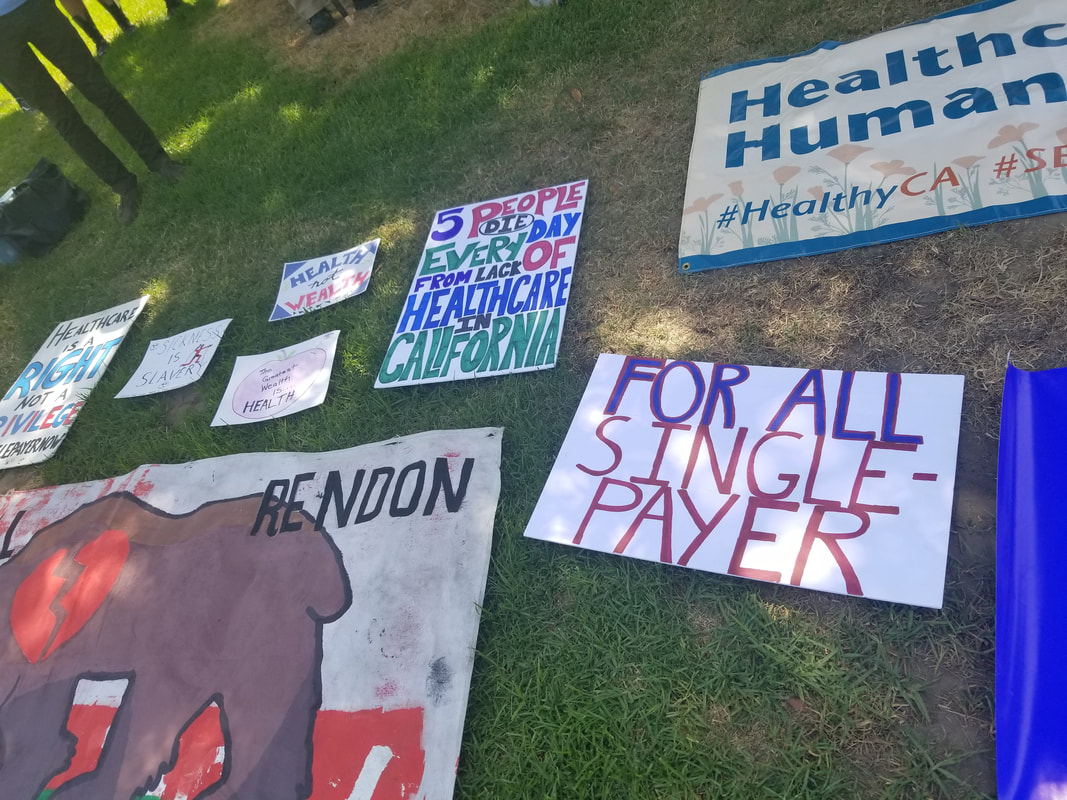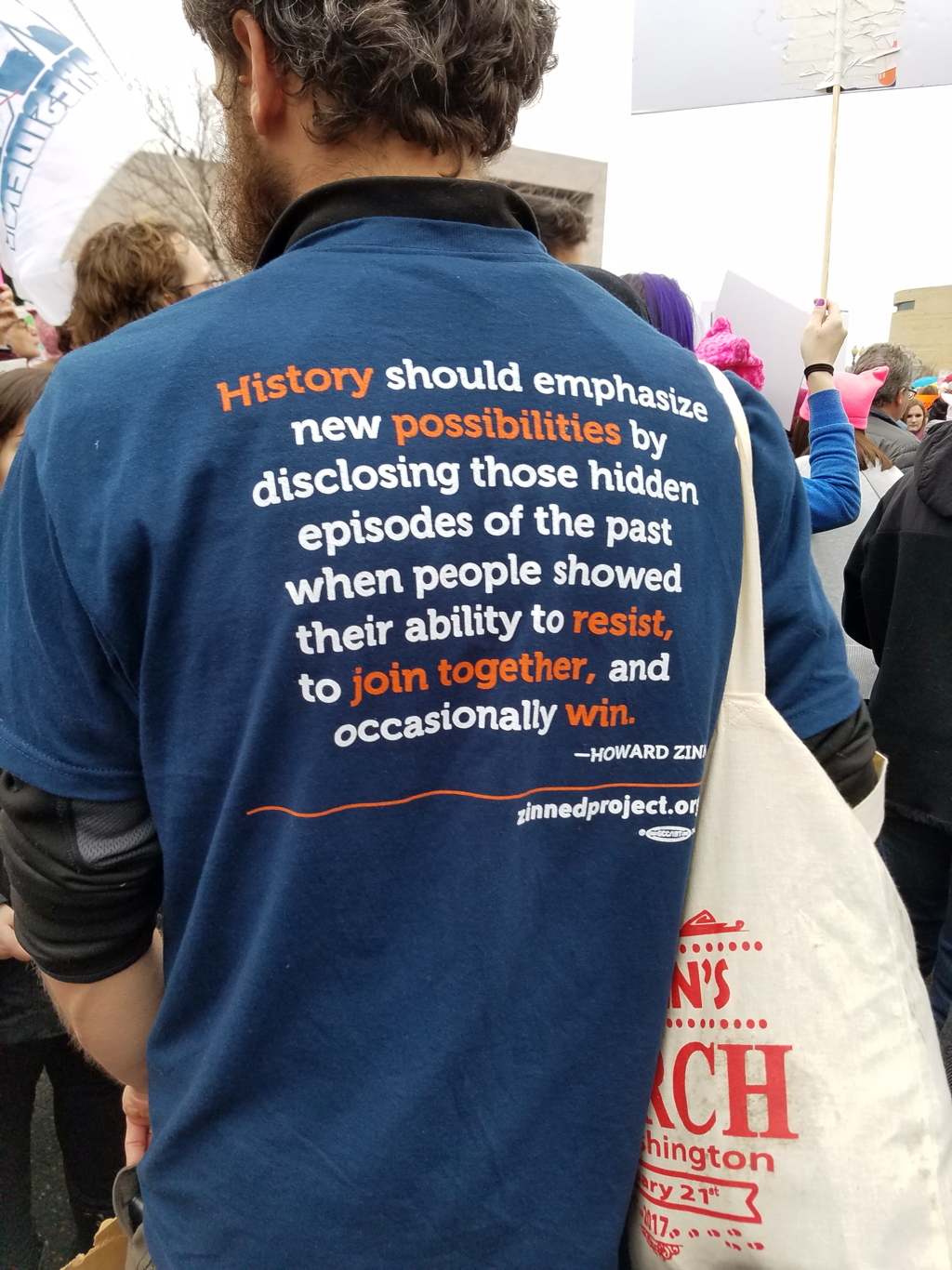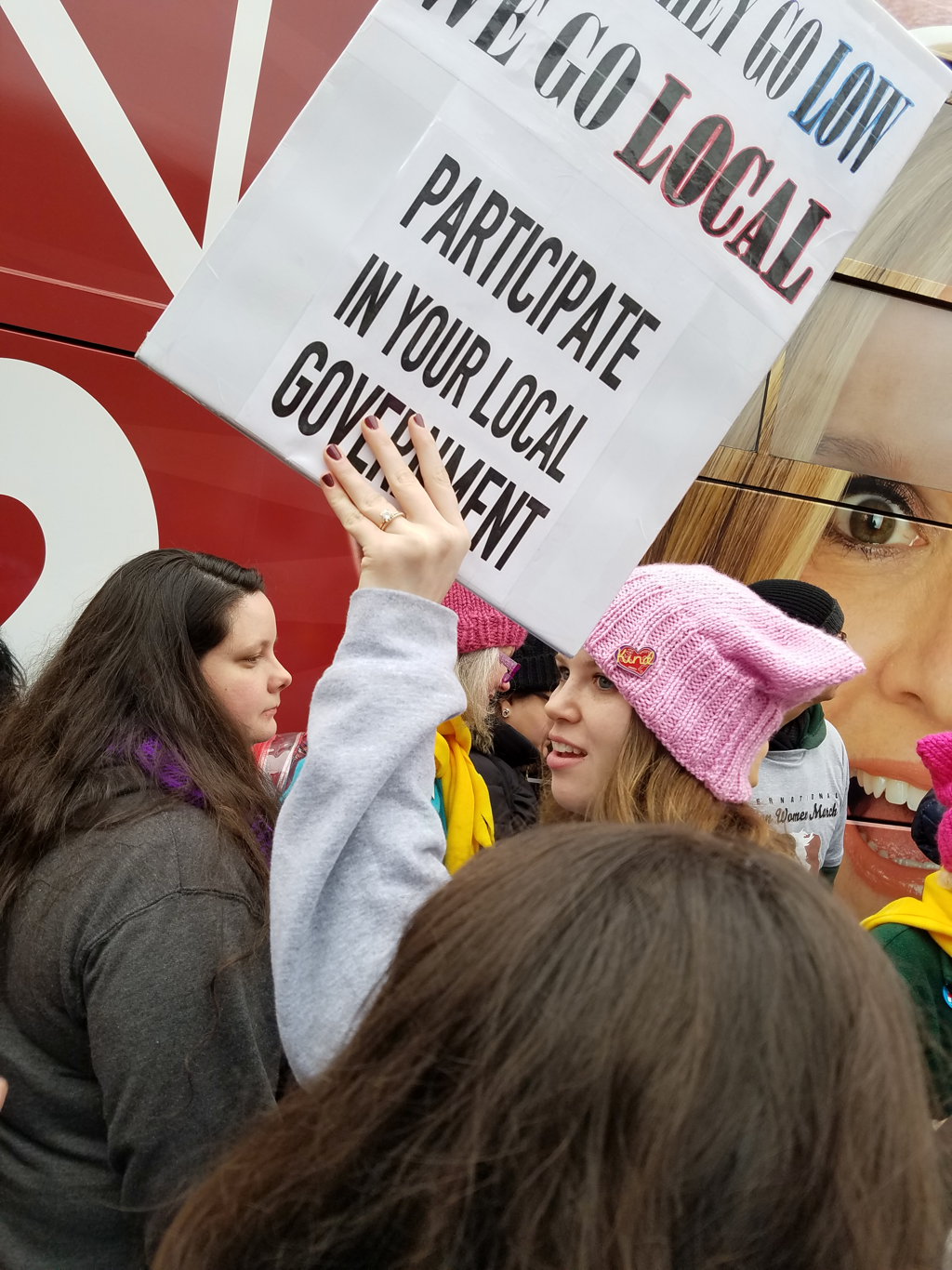 Walnut Creek March for Health Care. Walnut Creek March for Health Care. Another busy week in the world of health care policy. Last Sunday, I was in South Gate, CA with my son Marching for Medicare for all. We marched to Assembly Speaker Rendon’s office in South Gate and talked about the importance of health care as part of the US economy, but more importantly as essential to help people stay alive. Assembly Speaker Rendon has stalled single-payer health care in California. I came home to the San Francisco Bay Area and the US Senate started to discuss the “Repeal and Replace.” A week later, I went to a protest in Walnut Creek, CA with my son. In the US Senate, first Senator John McCain returned from surgery to vote for the Senate to allow for a vote and discussion to repeal the Affordable Care Act (ACA). He then joined his Republican colleagues, Susan Collins of Maine, and Lisa Murkowski from Alaska in voting to defeat those repeals. Americans have come to depend on the ACA for their basic health care. It is difficult to take a benefit away from people. When people don’t want something to change, it becomes more difficult than Congress can imagine to change that policy. Congress and the White House, generally choose to move on while leaving the issue that they were addressing at the moment unchanged. For some reason, Congress and the President seem unwilling to move on from the Affordable Care Act. It becomes abundantly clear that no matter what they choose to do at this point is going to result in 22 million or more Americans losing their insurance. That has not made many of Congress’ constituents very happy. The Affordable Care Act is not a perfect solution. Constituents who do not feel the need for insurance or who believe that insurance is too expensive for them simply pay the fine when they file their taxes. Some employers might like to grow their business but don’t hire a 50th employee because they would be required to provide health insurance. Low-income workers often work two or three jobs because employers do not want to provide health care for a full-time worker. The only thing Congress has succeeded in is helping their constituents to see that single-payer health care is a better solution than the Affordable Care Act. So the question becomes: Do we fix the ACA? Do we move to a Single-Payer system? I think the interesting messaging piece here comes when we start talking to our family and friends about what they want this to look like. I run into few people who believe, as some of our Republican members of congress seem to think, that health care should go back to what we had before the ACA. Most people had health care through their work. Some received health care through government programs, Medicare and Medicaid. Other people bought insurance on individual markets. About 50 million Americans went without medical insurance at all. Insurance could deny coverage for pre-existing conditions. Some policies were limited to lifetime limits, such as $1 million. Once the insured spent that much on medical care, their insurance would not ever cover anymore for them ever. Some people had these problems trying to get affordable coverage on the individual market. Other people got this coverage at work. Very few of the people we run into at Thanksgiving and Christmas dinner are going to be advocating for returning to this system. We are not going to have that conversation. Most people who want to return to a freer market system, are not going to be convinced by anything you and I have to say. The conversation we are going to be having is where do we go from here. I have five sisters and a brother. As you can imagine, we fall all over the map regarding opinions on many issues, including health care. I asked my newly retired sister what she thought we should do about health care. She surprised me by coming up with what many people see as a practical solution to the problems. She does not want to see the issue addressed through the government. She already believes that we pay too much in taxes. She gets her health care through Kaiser Permanente. It is provided as a benefit from work, even in retirement. She finds the treatment helpful, with a wellness focus. She believes that the care she is receiving is benefiting her and her family. She would like to see that treatment available to everyone. She is not clear as to how we should pay for it. She does not trust the government to do it, but she does see a social responsibility to make sure everyone is taken care of. I think that health care is one area where people who believe that the government should stay out of our lives, need to take action in regards to making sure everyone has health care. Even someone like my sister may come around when she sees that taxes are how we act as a community. The first step is to support steps in the direction of the nurturing parent. Health care is a good place to start. While the Affordable Care Act taken as a whole faced opposition among the American people, when polls asked about specifics of the bill (allowing young people to stay on their parents’ insurance, covering pre-existing conditions, covering certain basic services, expansion of Medicaid, supplements for the individual market) those specifics were all very popular. People do not like things like the mandate to carry insurance, but the only way to make an insurance based system work is to require everyone to participate. Even though people did not like being required to participate in the insurance market if they did not want to, the only way to have all of the other things people did want in the bill was to include everyone. Wednesday, the Senate voted on whether or not to repeal the ACA without a replacement. That effort went down in flames. On Friday, they voted again on a repeal light. Again, down in flames. The problem for the GOP in the Senate is that there is only one system better than ACA. That system is single payer. If the GOP wants to replace the ACA with a better one, they have to cover more people and take less money out of people’s pockets. Everything they have proposed so far has included covering fewer people and taking less money out of the pockets of big donors. If all of this is true if the only system that would provide better medical care for less money over all. if people are starting to express a desire for the improved system, what is it that Congress is up to? Whatever the Senate, the House or the President have proposed, it is not about health care. It is about a tax cut. Now we need to get our family and friends talking about health care. Do only people who can afford it get treatment? What do they think we should do to make sure everyone is covered? If they don’t think taxes should be used, how do you keep the prices down? What do you do about drug companies raising prices for drugs developed with taxpayer funds? Should insurance company executives be paid $20 million a year salaries? Is their contribution that valuable to the health care? Share your conversations or any other thoughts you have in the comments section. Share on your social media. Next time we are going to talk about listening. Also, let me know if you have topics you would like me to address. Sign up for the newsletter. That will be starting in the next couple of weeks.
1 Comment
 For many of us on the left, it is confusing that the reddest states also happen to be the poorest and the most reliant on the social programs that their elected officials oppose. They choose Governors rejected expanded Medicaid dollars. They have suffered some of the most devastating environmental disasters. But, they select attorney generals that sue the Environmental Protection Agency. They are in the most need of jobs in their states, but their leaders fire teachers, nurses, and other government workers to provide tax breaks to businesses that bring in automated plants that provide only a couple of dozen jobs. Why do they continue to embrace a philosophy and political movement that has not helped to solve any of the problems that their states face? As George Lakeoff, UC Berkley cognitive linguist tells us, people don’t vote their interests; they vote their values. Their values and ours create a mental frame. Our mental frame is the foundation of how we think, feel, and understand the world around us. It is known as our worldview. It is that difference in frame that has made it so difficult for us to cross that divide and talk to each other with compassion and understanding. George Lakoff fits American mythology into a family framework. We have founding fathers; we have the Daughters of the American Revolution. We send our sons and daughters to war. As Dr. Lakoff applied this framework to the political structure, he saw developing in Newt Gingrich's Contract with America in 1994; he found inspiration from psychology. He identified two types of families, the strict father family, and the nurturing parent family. The strict father family is hierarchical, teaches independence, and values working towards self-good as benefit of whole good. Dr. Lakoff identifies the strict father family as a refuge from a dangerous world. Since the world is a dangerous place and it is the job of the father to protect the family, decisions are based on the interest of the immediate family group, not on the greater good. The other side of the frame is the nurturing family. The nurturing family mindset is gender neutral. According to Lakeoff, it reflects the world as safe and welcoming. The nurturing family frame takes into account the greater good, not just the needs of the immediate family. The nurturing parent is more generous than the strict father because the world is not as scary for them. The nurturing family is more democratic than the strict father family. Everyone gets to have a say in the way things run. One person, one vote. Everyone’s needs are important. What do these two frames look like when applied to conservatives versus progressives? (I have decided that I will not always be using Republicans and Democrats to distinguish the two parties. Although we will often see Republicans fall along the strict father frame, while Democrats frequently frame their political thought as nurturing parents.) The paradox in all of this is that each frame tends to create the kind of world that they each envision. Conservatives create a world that is more dangerous and scarier. Red states are financially poorer, have worse air and water quality, residents live shorter lives, have more unemployment, and score lower on measures of general satisfaction. People in more progressive states live longer, have less unemployment, and greater satisfaction in their lives. Obviously, these are general statements. Statistics don’t apply to individuals. The question becomes: “How do we cross this divide?” How can we come to understand someone else’s worldview? How can we help someone move past their understanding of the world to find a new truth about how and why the world they live in has become so scary. George Lakoff tells us how important it is not to reinforce the frame we are trying to supplant. In other words, if we want people to stop thinking about limits on the fossil fuel industry as a problem for oil companies, but as a good for society, we have to stop talking about environmental regulations and start talking about environmental protections. In the same way, if people are talking about their world view, they are in some ways making that world view stronger. He is right. When the progressive movement is messaging on the larger stage, we must take care in how we word our arguments so that we are not just saying “no.” We must turn the discussion on its head. We will be talking more about this as we move along. But, for now, where we need to start is by listening. We must earn the right to express our views. When Hillary Clinton calls Trump supporters “deplorable,” she gave up on ever winning any of those votes. She said to those voters; “I don’t know you. I don’t want to know you.” The first step in learning to communicate with compassion is to understand how our frame creates a barrier to being able to care about others. We are going to talk about this much more over the coming weeks and months, but everyone wants a place to start. I’m going to give you George Lakoff’s starting point. He tells us to start getting people in touch with their nurturing parent. Don’t start in on a discussion of the issues. Don’t talk about the latest Russian scandal. Start by tapping into your FOX news loving uncle’s sense of compassion. Ask him to tell you about a time when he helped someone else without any expectation of getting anything in return. Do that, then tell us about it in the comments. Be sure to subscribe to our newsletter, so you don’t miss any posts. Share on social media. This weekend I am going to Southern California to the Medicare for all March. Next week we will talk about health care. We will also cover listening. References:
So why am I talking about this now? Bernie so well demonstrates much of what we are going to be talking about. Bernie (I can call him that because we are close personal friends. At least, he leaves everyone feeling that way.) He was born in 1941 in Brooklyn, New York to a working-class family. He went to the University of Chicago and while there cut his teeth as an organizer and civil rights advocate. In 1963, he traveled by bus to Washington DC and heard Martin Luther King’s “I Have a Dream” speech. After graduation, he moved to Vermont and started an initially failed political career. He supported his growing family working as a carpenter and as a small business owner. Bernie owned a company that made educational filmstrips. If you remember filmstrips, congratulations, you are officially an older adult. A filmstrip is a series of slides looped together and projected onto a screen. The soundtrack would include beeps so that the audiovisual student would know when to advance to the next slide. Bernie’s website avoids the need for that explanation by calling him a documentary filmmaker because what’s important about this is the foundation of his ability to communicate comes from this experience. Creating educational material that was informative as well as interesting and engaging in the filmstrip format must have been quite a challenge. Bernie Sanders can provide data, numbers, and graphs while making them interesting and relevant to the people he’s talking to. Look at the issues section of his website. Many of us liberals and progressives alike, often think that if we just give people the facts, all will be well. Once everyone understands what’s going on, they will all see things the way that we do. For reasons I will explain in later posts, it just doesn’t work that way. Bernie gives the facts, and he contextualizes them. He doesn’t just tell us about income inequality; he explains why income inequality matters for all Americans. He tells us how income inequality impacts our lives personally. He, further, explains why the ultra-wealthy are not entitled to all the riches. I have been reading a lot about income inequality and how the system is rigged in favor of the wealthy. Given enough time, I could probably explain it to you. Bernie’s genius is that he can do it quickly. The reason this is important is that we are all busy. Few people are busier than poor people. It is not that they are unable to understand how income inequality impacts their lives. They just don’t have time to think about it; accessing social services, availing oneself of available charitable organizations, caring for children when every night involves the search for a new roof over one’s head leaves little time for understanding macroeconomics. That is part of what made 45 so appealing as a candidate. So, your mission should you choose to accept it is to check out the link and see what Bernie says. I understand that not everyone reading this is necessarily going to fall squarely in the progressive camp. Just notice how he uses simple language to express complex concepts. He offers a complete explanation of the issues in just a few paragraphs. As we talk about other concepts related to messaging, we will be returning to look at some of the other tricks that Bernie uses to get his point across. No matter what our message, we need to learn to be just as clear, just as precise, and just as passionate in our concern for the needs of our audience. Be sure to share and comment. If you have anything you want to share about your experience with Bernie, please comment below. Also, sign up for our newsletter. Special thanks to Heather from Indivisible of Central Contra Costa County for being our first subscriber. Reference: Sanders, Bernie. Our Revolution: A Future to Believe in New York: Thomas Dunne Books, 2016 I first heard about the Women’s March in Washington in early December last year. As soon as I did, I used my frequent flyer miles to get a ticket from my home in Northern California to Washington, DC. I knew I had to go and figured I would find friends to join me later. Well, none of my friends wanted to travel to DC to attend the March. Most of them attended Sister Marches in LA, San Francisco, Oakland and Walnut Creek, California. I was going to DC. I did not care that I was going to be the only one I knew there, but if I was going to go, I wanted to make good use of the trip. So, I signed up to attend an event associated with the March about training for activists with Ralph Nader as the keynote speaker. I attended a workshop on communicating across economic and racial cultures for community organizers. The bottom line message of the two-hour workshop was that when professional organizers and local activists talk, they use different language. Professional activists use words like “mobilization,” “process,” and “benchmark.” Many of these words have little meaning outside of an academic environment. The people on the ground, the Union member/organizers, the community leaders who came up from the ground, use words like “jobs,” “housing,” and “healthcare.” Community leaders use words that make sense in the real world.They use words that make sense to people on either coast as well as in the middle. Words even 45 can understand. That started me thinking about how we talk to each other in the current political environment. That workshop was not the beginning of my experiments in communication. As a psychologist, the core of what I do every day is looking at how communication and behavior interact. I also had a brief stint in radio that required me to look at how I can express myself in simple language. My children were young at the time, and I was working with a coach who encouraged me to use the same vocabulary I would use with them. I had used the word “primate” in one show. The problem with that advice is that I never used a simple vocabulary with my children. The idea that I need to use clear language to explain complex concepts is not new to me. The idea of applying it to activism is.
|
Archives
March 2018
categoriesNo categories.
|









 RSS Feed
RSS Feed